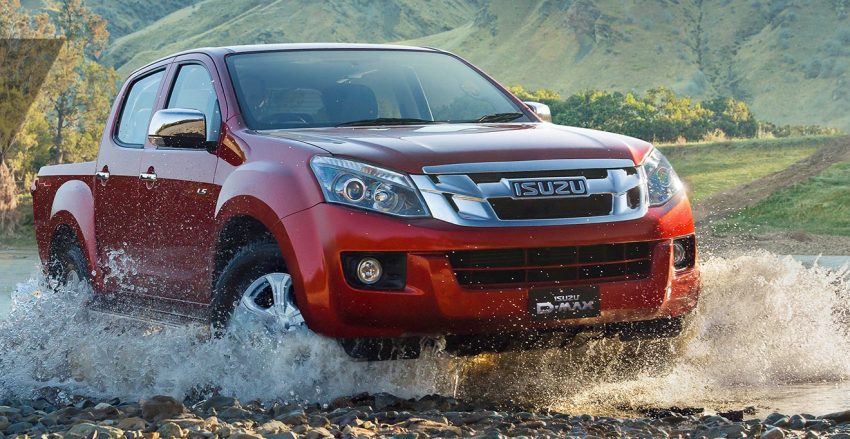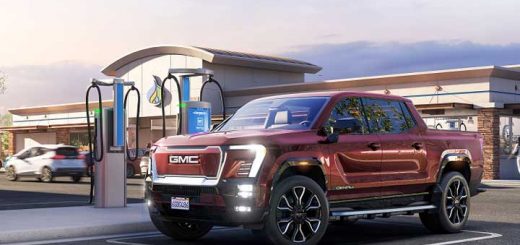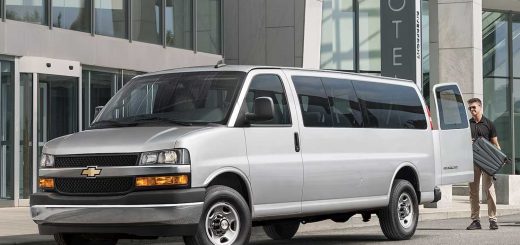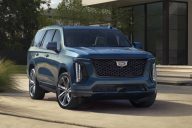While General Motors and Isuzu climb into bed together in the U.S. once again for medium duty trucks, it’s over in Asia. Automotive News reports the two automakers have ended its partnership to build pickup trucks in the region.
GM stated it wants to chase more upscale segments, while the Japanese automaker sticks to more commercial purposes.
GM and Isuzu most recently developed midsize pickup trucks for Asia, spawning the Isuzu D-Max and international Chevrolet Colorado.
“Both GM and Isuzu agree that due to unique requirements for each company, joint development of the next-generation midsize pickup truck for (GM) markets is no longer the optimal model for this project,” GM said in a statement.
“The direction each company wanted to take (for the vehicles) was changing,” an Isuzu spokesman said. Again, the Japanese automaker reiterated its interest in more work and commercial vehicles. GM stated it will pivot to more premium trucks and SUVs in the region.
GM began its pickup truck alliance with Isuzu in 2006, and most recently renewed the deal in 2014.














Comments
Maybe FIAT will jump in as a dance partner. GM doesn’t really need the help. I would like to see GM actually aquire an Asian automaker like Toyota and Nissan have. Such a move would gain then access to the huge Japanese market.
I think if GM acquired any Asian automaker it would probably be Hyundai.
Hyundai is part of a profoundly wealthy S Korean conglomerate & will never be sold. The goal of Hyundai Group (Kia) is to eventually dominate regardless of investment cost.
They may so well with so much cash to burn.
GM will keep playing in China. Id love to see GM team up with Tata to better tap both India as well as luxury.
Correct me if I’m wrong, but didn’t Mazda just partner with Isuzu to build midsize pickups? I thought I’ve seen it somewhere that they did. I think Fiat missed the boat again.
They sure did
It always amazes me that GM didn’t try to buy Isuzu outright during the 1970s when they held a 30% stake, given their recent financial performance they could probably afford to buy them outright now but that wouldn’t necessarily give them access to the Jap car market, Isuzu dropped passenger car sales years ago to concentrate on commercials.
Upscale and work trucks are the same truck minus several options with work trucks. Could this mean the GM won’t make the next Colorado work capable? Or am I missing something?
A work truck overseas is much different than what we have here.
Different beds, different engines and different suspensions before you get to the option luxury items.
Colorado overseas does have same 2.8 diesel as US version with additional 2.5 that NA truck don’t offer. That different bed is the aftermarket outfitter bed, just like in US. Suspension is beefed up for work trucks to handle the higher payload (we have 3/4 and 1 tons for that matter, but there are 1/2 HD occasionally). But the truck remains the same! About every truck has a work truck configuration unless it’s unibody, I’m just hoping that the next GM midsize won’t go unibody.
It appears to be another GM marketing boondoogle. I’ll put my money on Isuzu. The Isuzu marketing folks know their market very well. The key to that market is the culture of the people. What sells elsewhere necessarily will not sell well there. Luxury pick ups in Asia????
The luxury/upmarket comment made by GM was simply polite BS, an effort at sounding diplomatic.
My guess is that GM feels confident enough to build it themselves and they probably dream of a world truck tweaked for each market.
20th Century General Motors was an assemblage of domestic nameplates. 21st Century GM should stand for Global Motors in that it should be an assemblage of global brands with each company making a unique geographic/technological contribution. In addition, to reduce cost and build better vehicles, GM should be focusing on more limited partnerships such as hydrogen with Honda. GM could also save/earn billions if they were to sell/licence platforms such as Omega to companies like JLR and Alfa. In reality, a negligible amount of competitive advantage would be lost seeing as companies such as JLR ultimately end up spending billions to copy platforms and powertrains like those used by Cadillac. Why let Bosh, Seimans and other firms reap hearty profits instead of GM?
Mr Dcar, how many people in asia use there trucks, for work use and how people use it for, everyday use? So Isuzu know the market, so well that they, just focus on people who just does work In there truck, who saids everybody does in asia? Gm’s next gen truck’s will be BOF, I’m sore of that.
Actually, the D-Max can be had with a plethora of options. Only differences between the current Colorado and the D-Max is you can get the D-Max with their famed three litre turbo diesel which is the same as they use in their light duty trucks, only five speed manual and automatic transmissions for reliability reasons, as well as they have a more basic model available. The D-Max in LS-T form is just as luxurious and well equipped as the Z71, albeit without overload of plastic crap Holden put on it to make it look like one of those crappy Chevrolet dual cab things those in the hood have taken a liking to.
GM was eager to tap Isuzu’s strength in Southeast Asian markets and its diesel technology, and a deal was in many ways be a foray back to well traveled ground as the two companies were once equity partners for 35 years.
The U.S. automaker at one point owned as much as 49 percent in Isuzu before selling the holding down, disappointed with red ink spilled by Isuzu at the time and later strapped for cash of its own. Its last remaining 7.9 percent stake was sold in 2006 for $300 million.
Since emerging from its government-funded bankruptcy restructuring in 2009, GM has begun to forge some new alliances in efforts spearheaded by GM Vice Chairman Steve Girsky.
The re-emergence of GM as a strategic partner has helped Isuzu share the burden of developing hybrid and other technologies as environmental regulations around the world tighten.
But here is where the trouble is.
#1 Yes it would take around 34% to own controlling shares. But many of the open shares are owned by other automakers like Toyota etc. GM was not their only partner.
#2 the Diesel market while new to the mid size segment in America again is not a growing one globally. Many parts of the world will do away with it due to regulations. Or the cost of regulations will drive them out.
#3 Much of the present trucks do not translate here in America well. Like I stated what we get here is much different than over seas. Even the Aussie one is not the same. The changes delayed the truck here as what they get would not do well here.
#4 GM generally has little to gain from Isuzu post bail out. They did get some diesel technology and cost sharing but it is nothing they could not do them selves.
#5 Do not underestimate what is going on. GM could and may have a new partner lined up that may have more to offer and or more money to share cost. Isuzu was not a strong partner. Also they may be moving to work with someone else too that may have not been comfortable for GM? The known factors I suspect are in play here.
GM’s biggest markets is America with these trucks and that is where the focus will be. What they sell here can be converted to the third world products the others get GM has the money to do it now or possibly a new partner.
With stuff like this it is very involved and you can not always assume that one partner can or wants to buy out the other. Often more than one automaker is in play and that can stop things fast. Also debts and issues with the other maker can make difficult to buy.
They may have something to offer but they may also have more liabilities than what GM would like to take on.
Old GM used to do things because they had to. Today new GM does things because they want to. Isuzu now really has only a little to offer GM since they do not need their money for share cost. The interest dynamics of the two may have changed and it may just be time to move on.
Isuzu needed GM more than GM needed them. I would watch to see where GM goes as I suspect they have other alliances. lined up.
It’s worth adding that they’re not cutting their ties completely. This is just midsize trucks we’re talking about here. To be honest I don’t think GM needs help to build midsize pickup trucks.
GM & Isuzu will still work together on other projects, cab forward trucks for example.